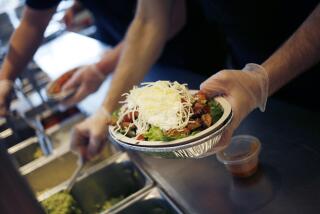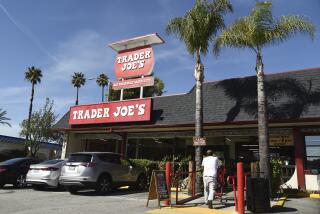Philip Morris Accepts Truce in Price War : Cigarettes: Like rivals, it raises wholesale prices. Analysts say the hikes hurt the industry’s campaign against a tax increase.
- Share via
NEW YORK — The company that started the tobacco price war last spring, industry leader Philip Morris USA, confirmed Friday that it will observe a truce.
The nation’s biggest tobacco company followed its rivals’ lead by posting a wholesale price increase on cigarettes of 4 cents a pack.
Industry analysts said the modest increase will probably stick, but also said it might undermine the industry’s argument that a federal tax hike will make cigarettes too expensive and hurt their sales.
“This certainly doesn’t bolster their case for a (tax) reduction,” said Barry Ziegler, tobacco analyst for A.G. Edwards & Sons in St. Louis.
In raising prices, Philip Morris matched increases announced three days ago by its biggest competitor, R.J. Reynolds Tobacco Co. Several smaller tobacco companies had already followed Reynolds’ lead.
These were the first price increases since the infamous “Marlboro Friday” in April when Philip Morris stunned the market with discounts that effectively cut the price of the industry’s best-selling brand by about 40 cents a pack.
Marlboro was losing market share to discount smokes as consumers who had become nervous about the economy and their jobs bought low-priced brands.
Reynolds and other tobacco makers soon matched the Marlboro discounts with promotions of their own on Winston, Camel and other premium brands.
Philip Morris converted the Marlboro promotional program into a wholesale price cut in midsummer and extended it to other premium-priced brands such as Merit, Benson & Hedges and Virginia Slims. Competitors followed.
“We are pleased with the strategy we announced on April 2,” Philip Morris spokesman Victor Han said Friday. “The goals were to reverse Marlboro’s decline and increase our overall share of the U.S. cigarette market.”
Tobacco makers had grown accustomed to raising prices for their premium brands by up to 10% a year. But at those levels, the industry’s most profitable brands were growing increasingly vulnerable to competition from discount and generic cigarettes.
At the time of the April announcement, Marlboros were being sold for about $2.27 a pack, while discount brands were about $1 cheaper and were selling in some markets for less than $1 a pack.
Ron Morrow, tobacco analyst for Smith Barney Shearson, said the price gap has been halved, with premium brands now averaging $1.75 to $1.85 a pack and the discounted brands still $1.25 to $1.30.
With a gap of about 50 cents, tobacco companies feel smokers are more likely to buy the premium brand for its perceived higher quality.
Han said Marlboro’s share of the U.S. market was about 25% in the third quarter, which ended in September, up from 21% in April.
He said discount brands’ share of the market has sunk to about 33.6% from 38.9% in the first quarter.
More to Read
Inside the business of entertainment
The Wide Shot brings you news, analysis and insights on everything from streaming wars to production — and what it all means for the future.
You may occasionally receive promotional content from the Los Angeles Times.










